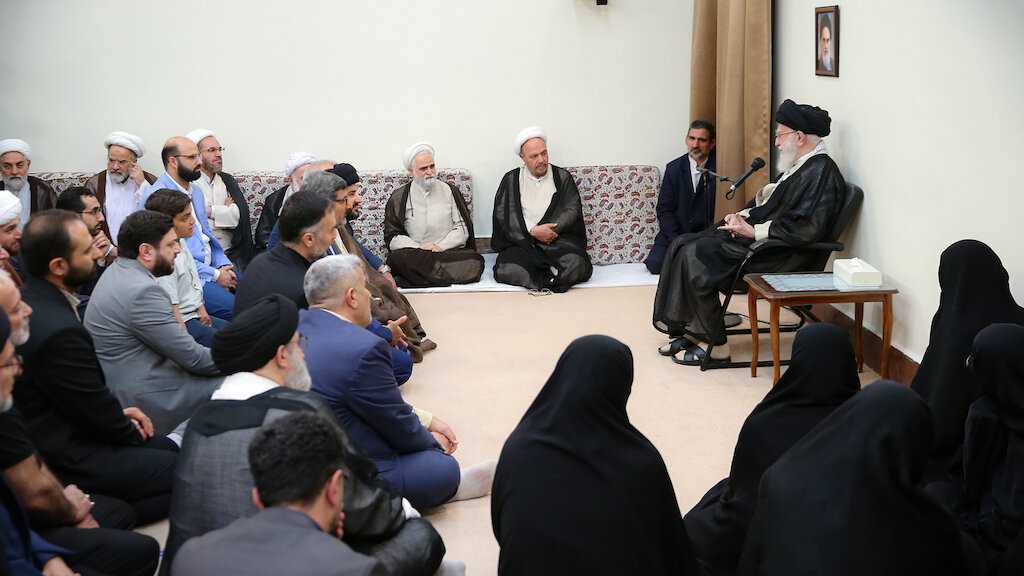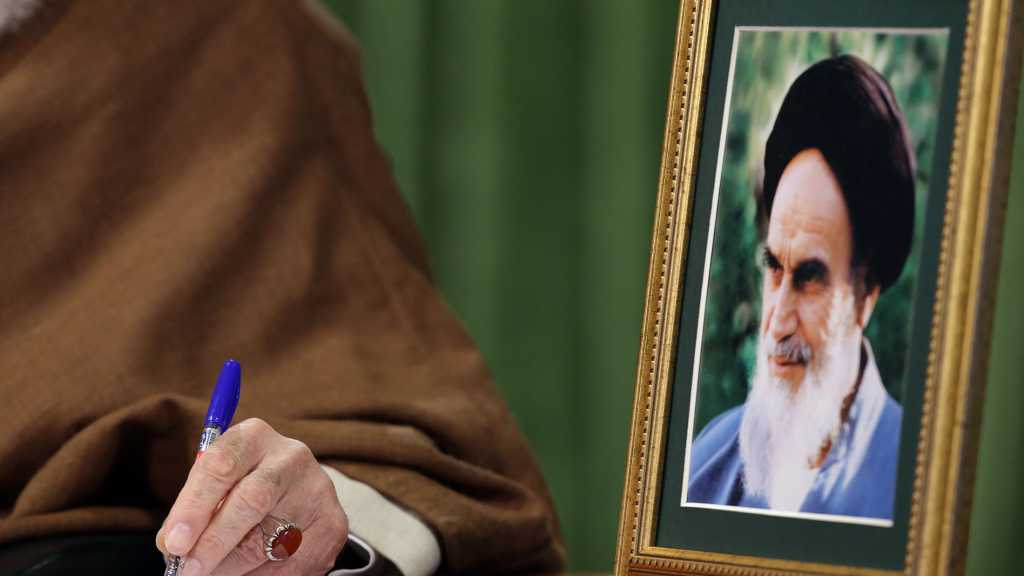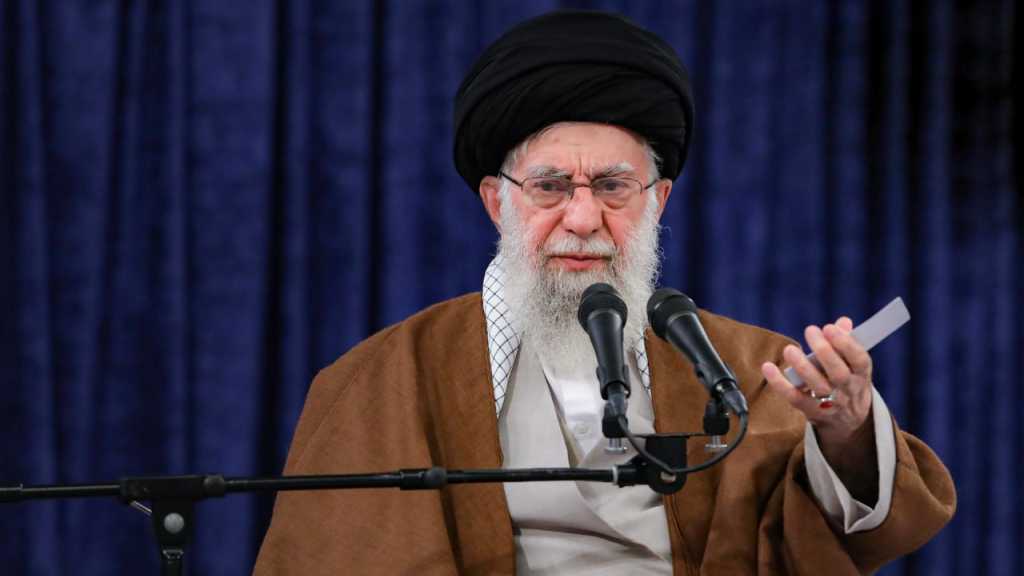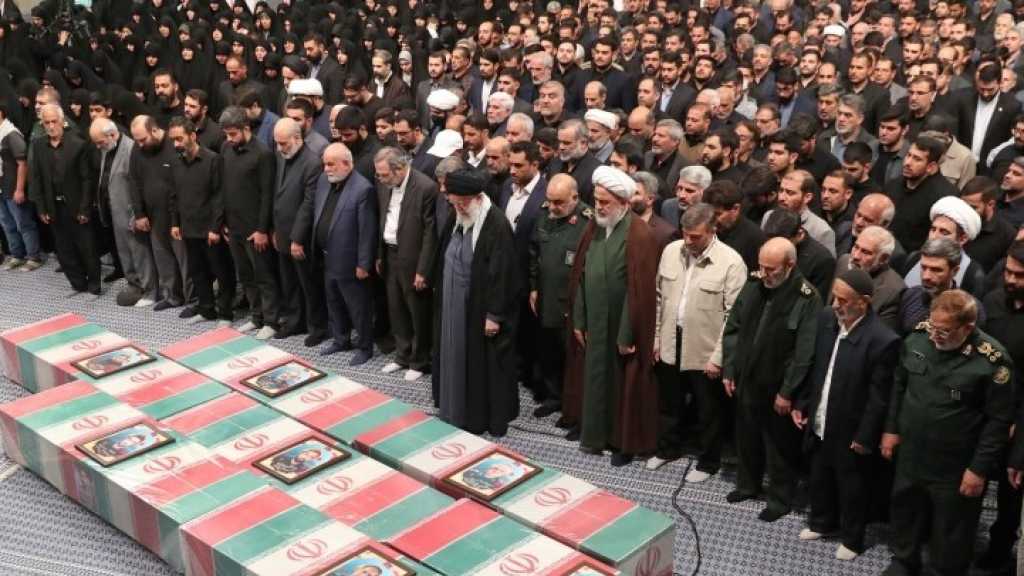
Imam Khamenei Meets State Representative, Assures US, “Israel” Behind World Troubles

Local Editor
Supreme Leader of the Islamic Revolution His Eminence Imam Sayyed Ali Khamenei met Friday several officials from different countries taking part in the Nam Summit, and discussed major issues particularly related to the region.
During a meeting with the Syrian Prime Minister Wael al-Halqi on the sidelines of the 16th Non-Aligned Movement (NAM) Summit in Tehran, Imam Khamenei called on Damascus to unveil the plots hatched by the enemies in a move to enlighten the world public opinion about realities in Syria.
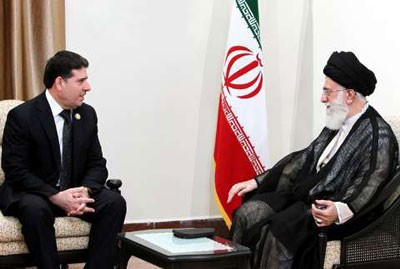
His Eminence further blamed the US and the Zionist regime for the crisis in Syria, and said, "NAM is definitely more entitled to politically deal with the Syrian issues than the US, the NATO and certain European states."
He further described the status quo and the massacre of people in Syria as "unacceptable", and pointed out that "those who pave the ground for the inundation of arms supplies to Syria and render financial support to irresponsible groups are the main culprits who should be blamed."
"If the opposition of the European states who are now staging demonstrations are given money and weapons, the present conditions in Syria would be seen in those countries as well," the leader added.
In parallel, Imam Khamenei further described Syrian Bashar al-Assad's government as an "oppressed government" with regard to the recent developments in Syria.
"The Syrian government should continue political reforms in a bid not to give an excuse to the opposition and excuse-seekers, and meantime disclose the reality and the behind-the-scene plots in Syria for the Arab public opinion," he confirmed.
For his part, al-Halqi thanked Imam Khamenei for Iran's support, and delivered greetings from Syrian President Bashar al-Assad, who did not attend the NAM summit.
"The Syrian government is determined to confront all terrorist groups and to cleanse areas of these groups while moving ahead with political reforms and national dialogue," he was quoted as saying.
On Thursday, the Syrian PM blamed certain states, the Salafis and the al-Qaeda for terrorist operations which have claimed the lives of thousands of people in his country, and said terrorist groups supported by certain foreign actors are misusing differences in his country to bring Syria into turmoil.
Also at a Friday meeting with Iraqi Prime Minister Nouri al-Maliki who has attended the 16th Summit of the Non-Aligned Movement (NAM) in the Iranian capital Tehran among other officials, Ayatollah Imam Khamenei iterated that the ongoing unrest in Syria as the West's "proxy war" against Damascus aimed at serving "Israel's" interests.
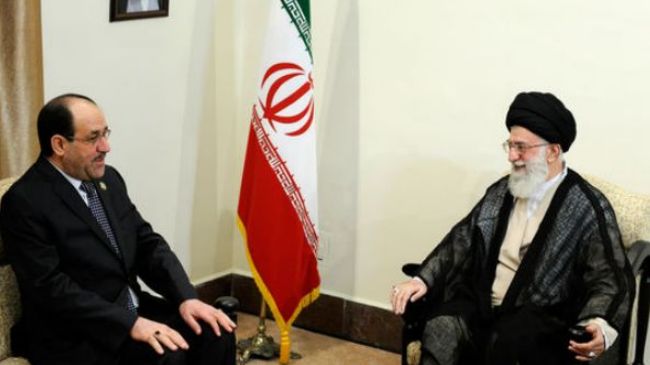 "The reality of developments in Syria is a proxy war against the Syrian government by certain governments led by the US and some other powers aimed at serving the interests of the Zionist regime and harming the resistance in the region," said Ayatollah Khamenei.
"The reality of developments in Syria is a proxy war against the Syrian government by certain governments led by the US and some other powers aimed at serving the interests of the Zionist regime and harming the resistance in the region," said Ayatollah Khamenei.
His Eminence noted that the NAM should take the initiative by becoming politically involved in the Syrian crisis and put an end to the existing situation.
Iran and Iraq, as the presidents of the NAM and the Arab League respectively, should utilize the potentials of these international bodies in order to sway serious and positive influence with regard to the regional issues, Imam Khamenei added.
Maliki, for his part, expressed satisfaction over Baghdad's success to surmount many of its challenges and called for Iran's assistance to help the country pass through the reconstruction process.
Meeting the Zimbabwean President Robert Mugabe, Imam Khamenei said the real power of a country lies in the reinforcement of the national resolve and progress in scientific and social spheres, rejecting nuclear arms as a component of a nation's power.
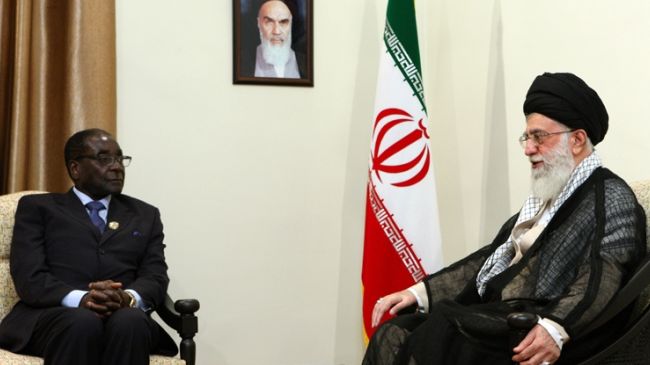
"We consider real power in strengthening the national will and socio-scientific advances, not in atomic weapons," Ayatollah Khamenei noted.
Mugabe, for his part, denounced Western countries' "big lies about defending human rights, law and democracy," adding that "The record of the US, England and France and their double-standard behaviors towards the developments in the Middle East show that Westerners are merely after oil resources.
The Zimbabwean president said the approach of the West to Syria is indicative of a tenuous and fragile plot to undermine the Islamic Republic.
Moreover, in a Friday meeting with Bangladeshi Prime Minister Sheikh Hasina, Imam Khamenei noted that if unity and cooperation seriously existed among independent and Muslim states, they would not have witnessed the ongoing crises in Bahrain and Syria.
Emphasizing that the only way to confront the global policies of bullying powers is close collaboration among independent and Muslim states, the Leader underlined that "in case such unity and cooperation existed in a serious manner, we would not have been witness to the unfortunate developments that are currently underway in Syria and Bahrain."
 Ayatollah Imam Khamenei further pointed to the influential role of Bangladesh as a member of the Organization of Islamic Cooperation, the Non-Aligned Movement (NAM), as well as the D8 Group, adding that cooperation among Islamic countries will be certainly in line with the interests of the Muslim nations and further increase their power.
Ayatollah Imam Khamenei further pointed to the influential role of Bangladesh as a member of the Organization of Islamic Cooperation, the Non-Aligned Movement (NAM), as well as the D8 Group, adding that cooperation among Islamic countries will be certainly in line with the interests of the Muslim nations and further increase their power.
Imam Khamenei also pointed to historical and cultural commonalities between Iran and Bangladesh and noted that profound cultural ties provide a very good ground for the promotion of political, international, economic and social cooperation between Tehran and Dhaka.
For her part, the Bangladeshi prime minister concurred with Ayatollah Khamenei by stressing the need for Islamic and independent countries to mobilize their resources and capacities and prevent global powers to make decisions for other nations.
In addition, meeting with Algerian Parliament Speaker Abdul Qadir bin Saleh, the Leader of the Islamic Revolution Ayatollah Sayyed Ali Khamenei assured that Algeria has been Iran's good partner and in anti-"Israeli" resistance front since the victory of the Islamic Revolution.
"There are great capacities for the expansion of economic, political and cultural ties between Iran and Algeria which must be activated," Ayatollah Khamenei said.
Bin Saleh, for his part, said participation of the heads of state and senior officials from different countries in the Tehran Summit under existing circumstances is very important and meaningful.

Furthermore, in a meeting with Sudanese President Omar Hassan al-Bashir, Sayyed Ali Khamenei stressed the importance of remaining vigilant against plots by those who wish ill on Muslim nations.
"We should take care not to make mistakes in understanding and analyzing situations," Ayatollah Khamenei said.
The Leader Imam Khamenei urged Muslim and regional countries to play a more active role in important issues and added that Muslim and independent states can make use of the Non-Aligned Movement's good capacity to take the initiative regarding regional issues, including Palestine and Syria.
The Sudanese president, for his part, said regional developments such as those of Palestine and Syria are among "important and worrying" issues and called for drawing on the NAM's potential to resolve them.
Meanwhile, in a meeting with Boni Yayi, Benin's president and the rotating chairman of the African Union, Ayatollah Khamenei said Iran's foreign policy attaches great importance to the African continent.
Imam Khamenei pointed to the colonization of Africa by Western powers and stated that the restoration of one's identity and relying on the natural inner might are the only ways to set oneself free from the domination of the colonialists.
His Eminence underlined the importance of cooperation among independent countries and urged vigilance against enemies.
Iran assumed the rotating presidency of NAM for a three-year term during the 16th NAM Summit which wrapped up in Tehran on Friday.
Over 100 countries sent representatives to the NAM summit, which kicked off on Sunday with a two-day expert-level meeting in the Iranian capital, followed by a foreign ministerial meeting that ended on Wednesday.
NAM is an international organization with 120 member states that is not formally aligned with or against any major power bloc.
Source: News Agencies, edited by moqawama.org
Supreme Leader of the Islamic Revolution His Eminence Imam Sayyed Ali Khamenei met Friday several officials from different countries taking part in the Nam Summit, and discussed major issues particularly related to the region.
During a meeting with the Syrian Prime Minister Wael al-Halqi on the sidelines of the 16th Non-Aligned Movement (NAM) Summit in Tehran, Imam Khamenei called on Damascus to unveil the plots hatched by the enemies in a move to enlighten the world public opinion about realities in Syria.

His Eminence further blamed the US and the Zionist regime for the crisis in Syria, and said, "NAM is definitely more entitled to politically deal with the Syrian issues than the US, the NATO and certain European states."
He further described the status quo and the massacre of people in Syria as "unacceptable", and pointed out that "those who pave the ground for the inundation of arms supplies to Syria and render financial support to irresponsible groups are the main culprits who should be blamed."
"If the opposition of the European states who are now staging demonstrations are given money and weapons, the present conditions in Syria would be seen in those countries as well," the leader added.
In parallel, Imam Khamenei further described Syrian Bashar al-Assad's government as an "oppressed government" with regard to the recent developments in Syria.
"The Syrian government should continue political reforms in a bid not to give an excuse to the opposition and excuse-seekers, and meantime disclose the reality and the behind-the-scene plots in Syria for the Arab public opinion," he confirmed.
For his part, al-Halqi thanked Imam Khamenei for Iran's support, and delivered greetings from Syrian President Bashar al-Assad, who did not attend the NAM summit.
"The Syrian government is determined to confront all terrorist groups and to cleanse areas of these groups while moving ahead with political reforms and national dialogue," he was quoted as saying.
On Thursday, the Syrian PM blamed certain states, the Salafis and the al-Qaeda for terrorist operations which have claimed the lives of thousands of people in his country, and said terrorist groups supported by certain foreign actors are misusing differences in his country to bring Syria into turmoil.
Also at a Friday meeting with Iraqi Prime Minister Nouri al-Maliki who has attended the 16th Summit of the Non-Aligned Movement (NAM) in the Iranian capital Tehran among other officials, Ayatollah Imam Khamenei iterated that the ongoing unrest in Syria as the West's "proxy war" against Damascus aimed at serving "Israel's" interests.
 "The reality of developments in Syria is a proxy war against the Syrian government by certain governments led by the US and some other powers aimed at serving the interests of the Zionist regime and harming the resistance in the region," said Ayatollah Khamenei.
"The reality of developments in Syria is a proxy war against the Syrian government by certain governments led by the US and some other powers aimed at serving the interests of the Zionist regime and harming the resistance in the region," said Ayatollah Khamenei. His Eminence noted that the NAM should take the initiative by becoming politically involved in the Syrian crisis and put an end to the existing situation.
Iran and Iraq, as the presidents of the NAM and the Arab League respectively, should utilize the potentials of these international bodies in order to sway serious and positive influence with regard to the regional issues, Imam Khamenei added.
Maliki, for his part, expressed satisfaction over Baghdad's success to surmount many of its challenges and called for Iran's assistance to help the country pass through the reconstruction process.
Meeting the Zimbabwean President Robert Mugabe, Imam Khamenei said the real power of a country lies in the reinforcement of the national resolve and progress in scientific and social spheres, rejecting nuclear arms as a component of a nation's power.

"We consider real power in strengthening the national will and socio-scientific advances, not in atomic weapons," Ayatollah Khamenei noted.
Mugabe, for his part, denounced Western countries' "big lies about defending human rights, law and democracy," adding that "The record of the US, England and France and their double-standard behaviors towards the developments in the Middle East show that Westerners are merely after oil resources.
The Zimbabwean president said the approach of the West to Syria is indicative of a tenuous and fragile plot to undermine the Islamic Republic.
Moreover, in a Friday meeting with Bangladeshi Prime Minister Sheikh Hasina, Imam Khamenei noted that if unity and cooperation seriously existed among independent and Muslim states, they would not have witnessed the ongoing crises in Bahrain and Syria.
Emphasizing that the only way to confront the global policies of bullying powers is close collaboration among independent and Muslim states, the Leader underlined that "in case such unity and cooperation existed in a serious manner, we would not have been witness to the unfortunate developments that are currently underway in Syria and Bahrain."
 Ayatollah Imam Khamenei further pointed to the influential role of Bangladesh as a member of the Organization of Islamic Cooperation, the Non-Aligned Movement (NAM), as well as the D8 Group, adding that cooperation among Islamic countries will be certainly in line with the interests of the Muslim nations and further increase their power.
Ayatollah Imam Khamenei further pointed to the influential role of Bangladesh as a member of the Organization of Islamic Cooperation, the Non-Aligned Movement (NAM), as well as the D8 Group, adding that cooperation among Islamic countries will be certainly in line with the interests of the Muslim nations and further increase their power.Imam Khamenei also pointed to historical and cultural commonalities between Iran and Bangladesh and noted that profound cultural ties provide a very good ground for the promotion of political, international, economic and social cooperation between Tehran and Dhaka.
For her part, the Bangladeshi prime minister concurred with Ayatollah Khamenei by stressing the need for Islamic and independent countries to mobilize their resources and capacities and prevent global powers to make decisions for other nations.
In addition, meeting with Algerian Parliament Speaker Abdul Qadir bin Saleh, the Leader of the Islamic Revolution Ayatollah Sayyed Ali Khamenei assured that Algeria has been Iran's good partner and in anti-"Israeli" resistance front since the victory of the Islamic Revolution.
"There are great capacities for the expansion of economic, political and cultural ties between Iran and Algeria which must be activated," Ayatollah Khamenei said.
Bin Saleh, for his part, said participation of the heads of state and senior officials from different countries in the Tehran Summit under existing circumstances is very important and meaningful.

Furthermore, in a meeting with Sudanese President Omar Hassan al-Bashir, Sayyed Ali Khamenei stressed the importance of remaining vigilant against plots by those who wish ill on Muslim nations.
"We should take care not to make mistakes in understanding and analyzing situations," Ayatollah Khamenei said.
The Leader Imam Khamenei urged Muslim and regional countries to play a more active role in important issues and added that Muslim and independent states can make use of the Non-Aligned Movement's good capacity to take the initiative regarding regional issues, including Palestine and Syria.
The Sudanese president, for his part, said regional developments such as those of Palestine and Syria are among "important and worrying" issues and called for drawing on the NAM's potential to resolve them.
Meanwhile, in a meeting with Boni Yayi, Benin's president and the rotating chairman of the African Union, Ayatollah Khamenei said Iran's foreign policy attaches great importance to the African continent.
Imam Khamenei pointed to the colonization of Africa by Western powers and stated that the restoration of one's identity and relying on the natural inner might are the only ways to set oneself free from the domination of the colonialists.
His Eminence underlined the importance of cooperation among independent countries and urged vigilance against enemies.
Iran assumed the rotating presidency of NAM for a three-year term during the 16th NAM Summit which wrapped up in Tehran on Friday.
Over 100 countries sent representatives to the NAM summit, which kicked off on Sunday with a two-day expert-level meeting in the Iranian capital, followed by a foreign ministerial meeting that ended on Wednesday.
NAM is an international organization with 120 member states that is not formally aligned with or against any major power bloc.
Source: News Agencies, edited by moqawama.org
Comments
